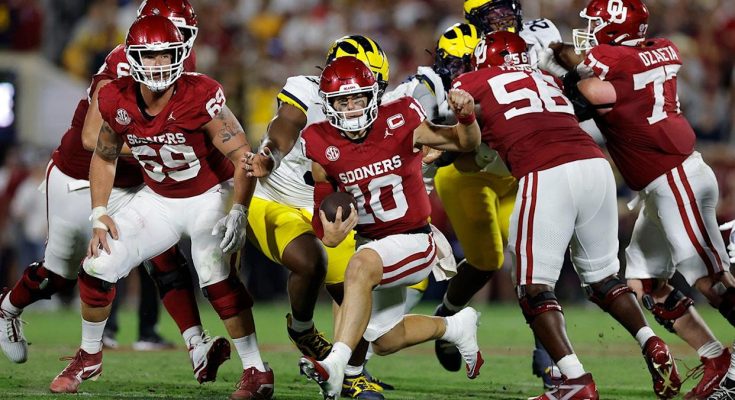The Michigan Wolverines came into their clash with the Oklahoma Sooners carrying high hopes, as the program looked to steady itself against one of college football’s most consistent powerhouses. Yet, in a game filled with drama, momentum swings, and questionable decisions, it wasn’t just the players and coaches who became part of the story. The broadcast booth managed to insert itself into the narrative in a way only sports fans can understand, and for Michigan supporters, it added another layer of frustration to an already painful defeat. ESPN’s nationally televised coverage of the game featured a star announcer who, in a moment of overconfidence or simply the curse of live commentary, unleashed what many are calling the dreaded “announcer jinx.” It’s the kind of slip that football fans have seen countless times before: a broadcaster praises a team’s perfect execution, a player’s flawless performance, or a coach’s unshakable strategy, only for the opposite to happen seconds later. When the jinx arrived in this Michigan-Oklahoma battle, the timing could not have been worse, and the fallout had both fans and analysts shaking their heads.
For Michigan, the game started with a mixture of promise and tension. Oklahoma entered the contest ranked highly, powered by a balanced offense and a defensive front that has been one of the most physical in the nation. The Wolverines, though, were eager to prove their mettle after a stretch of uneven performances, and early drives suggested they were up for the challenge. Michigan’s quarterback looked composed in the pocket, the offensive line initially held its ground against Oklahoma’s relentless pass rush, and the Wolverines’ defense showed flashes of the intensity that has long defined the program. It was the kind of start that had fans feeling optimistic, and the broadcast booth wasted no time highlighting Michigan’s execution.
That’s when it happened. ESPN’s play-by-play voice, one of the network’s most recognizable stars, noted how Michigan’s quarterback had yet to throw an interception in the game and praised his poise under pressure. It was delivered in the confident tone that audiences have come to expect, a mix of enthusiasm and authority meant to heighten the drama of the moment. But football fans know what tends to come next. Almost as if on cue, on the very next play, the quarterback launched a deep ball intended for his top receiver. The pass sailed just a bit high, Oklahoma’s safety read it perfectly, and within seconds the ball was going the other way. An interception, devastating in both its timing and impact, set up Oklahoma with prime field position. The Sooners capitalized, punching in a touchdown that swung momentum firmly in their favor. In an instant, Michigan’s early rhythm was shattered, and fans everywhere groaned not only at the turnover but also at the broadcaster’s too-perfect setup.
Sports fans are superstitious by nature, and announcer jinxes have become almost folklore within the culture of sports broadcasting. From pitchers losing no-hitters in baseball after being praised on-air to football kickers missing “automatic” field goals moments after their reliability is noted, the phenomenon has become a running joke that never fails to sting when it happens to your team. In this case, though, it felt less like a joke and more like a cruel twist of fate for a Michigan squad already struggling to find consistency. The interception wasn’t just a turnover; it was a turning point. Oklahoma’s offense, sparked by the gift of field position, began to find its rhythm, and the Wolverines were forced to play from behind for much of the night.
As the game wore on, Michigan attempted to claw back, but every step forward seemed to be answered by Oklahoma’s composure and explosiveness. The Sooners’ quarterback displayed the kind of leadership that defines elite programs, making clutch throws on third downs and keeping the Wolverines’ defense off balance with his mobility. Their ground game also found its stride, wearing down Michigan’s front seven and keeping the clock moving in Oklahoma’s favor. Meanwhile, the Wolverines looked rattled. Drops by receivers, missed assignments on the offensive line, and questionable play-calling left fans exasperated. Yet, through it all, the shadow of that announcer jinx lingered. Social media erupted almost instantly after the interception, with fans sharing clips of the broadcast and blaming the ESPN star for putting the curse on their team. “Never say it out loud!” one fan tweeted, echoing the collective frustration of a fanbase that has seen more than its fair share of heartbreak in big games.
To be fair, the announcer wasn’t the reason Michigan lost. Football games are decided by execution on the field, coaching decisions, and the ability to respond to adversity. But what made the moment sting so much for Wolverines fans was how perfectly it seemed to encapsulate their season. Every time hope builds, something seems to go wrong. Every time the program edges closer to turning a corner, a setback pulls them back. And when an ESPN broadcaster inadvertently inserts himself into that narrative with an ill-timed comment, it only adds to the sense that Michigan is fighting both their opponents and fate itself. It’s the kind of storyline that feels uniquely cruel, and for fans who pour so much emotion into each game, it’s impossible not to latch onto.
Oklahoma, on the other hand, deserves immense credit for seizing the moment and executing when it mattered most. Their ability to pounce on mistakes and turn them into points was the difference in the game, and it spoke to the maturity and discipline of a program that has been among the nation’s elite for decades. The Sooners didn’t flinch when Michigan struck first, and they didn’t allow the Wolverines to build momentum when opportunities presented themselves. Instead, they showcased the kind of balance and resilience that championship-caliber teams need. For Michigan, that contrast was glaring. The Wolverines had opportunities but failed to capitalize. Oklahoma had opportunities and made them count.
What makes this loss particularly painful for Michigan is that it wasn’t just about X’s and O’s. It was about the narrative, the perception, and the feeling that the program remains just a step behind the very best. Every fanbase wants to believe their team is ready to contend, but games like this are a sobering reminder of how fine the margins are in college football. A single turnover, a single mistake, a single jinxed comment from the broadcast booth can tilt the balance, and when the opponent is as skilled and disciplined as Oklahoma, those margins matter even more. For the Wolverines, it’s yet another chapter in a story of frustration, one where promise collides with disappointment.
The debate now rages about whether the concept of an announcer’s jinx is real or just superstition. Statisticians will point out that correlation doesn’t equal causation, and that a quarterback throwing an interception after being praised is more about probability than fate. But for fans, logic doesn’t always apply in the heat of the moment. Sports are about emotion as much as they are about numbers, and when you see your team falter seconds after an announcer sings their praises, it’s hard not to believe in the curse. Whether real or imagined, the jinx has become a part of sports culture, and this Michigan-Oklahoma game will go down as one of its most memorable examples.
In the aftermath, Michigan’s coaches and players will surely look inward. The quarterback must rebound from a costly mistake, the offensive line has to regroup, and the defense will need to sharpen up if the Wolverines want to salvage their season. Oklahoma, meanwhile, will use this win as fuel for their continued push up the rankings. But for the fans, the memory of that broadcaster’s words and the interception that followed will linger far longer than any coach’s film session. It becomes a story they’ll tell again and again, a moment that encapsulates both the agony and the humor of being a sports fan.
At the end of the day, the beauty of sports lies in their unpredictability. We watch because we don’t know what will happen, because in every game there’s the potential for magic or heartbreak. Announcer jinxes are part of that unpredictability, a reminder that as much as we try to analyze and predict, fate often has its own script. For Michigan fans, this game was a reminder of just how cruel that script can be. For Oklahoma fans, it was another reason to celebrate the resilience and execution of their team. And for everyone else, it was another story to add to the long history of sports’ most unexplainable quirks.
What do you think? Do you believe in the power of the announcer’s jinx, or is it just a silly superstition fans cling to when things go wrong? Michigan fans, does this loss feel like fate is conspiring against you, or was it simply a matter of poor execution? And for Oklahoma supporters, how much confidence does this win give you moving forward in the season? Share your thoughts, frustrations, and celebrations in the comments below—I’d love to hear your take on one of the wildest twists of this college football weekend.



